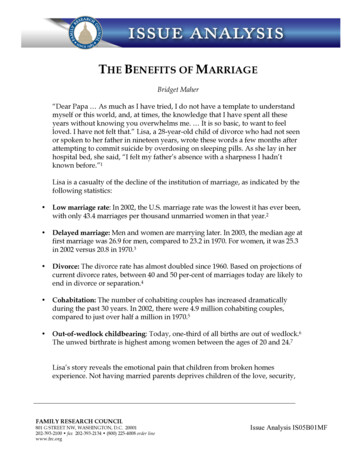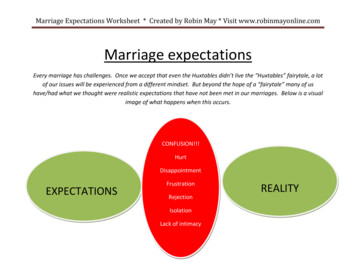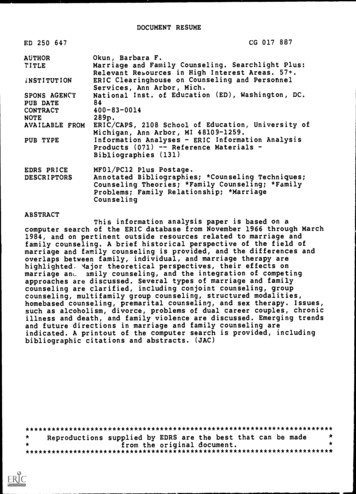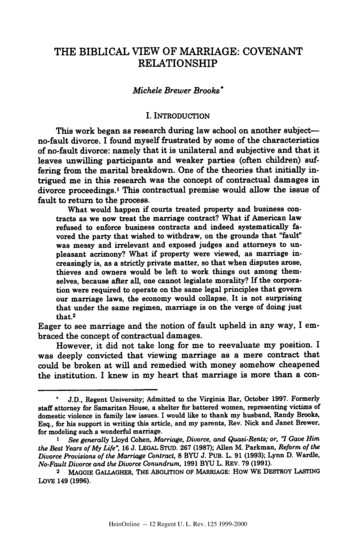
Transcription
Boundaries in Marriage– Sunday School Notes –Christoph KreitzBoundaries are the personal property lines which define who we are, what we are responsiblefor, and where we have limits and limitations. Having clear boundaries is essential for ahealthy, balanced lifestyle as well as for spiritual growth and for our ability to give andreceive love. Yet many Christians lack boundaries because they fear being selfish, unloving,and unsubmissive.In this Sunday School Series, which is based on the books “Boundaries” and “Boundariesin Marriage” by Drs. Henry Cloud & John Townsend, we want to take a biblical view ofboundaries and in particular of boundaries in marriage. We will study what boundariesare and why they are necessary for our Christian walk. We will then look at ways to solvecommon boundaries conflicts with ourselves, friends, our work, our family, our children,and our spouse. Afterwards we will focus on building proper boundaries and resolvingconflicts in our marriage. Finally we will discuss how to avoid the misuse of boundariesand to develop healthy ones instead.i
Contents1 Introduction1I8General Principles2 What is a boundary?2.1 Misunderstandings about Boundaries . . . .2.2 Central Aspects . . . . . . . . . . . . . . . .2.3 Why are Boundaries important in Marriage?2.4 What is within the Boundaries? . . . . . . .2.5 Examples of Boundaries . . . . . . . . . . .2.6 Common Boundary Myths . . . . . . . . . .3 Boundary Problems3.1 Compliance . . . . . . . . . . . . . .3.2 Avoidance . . . . . . . . . . . . . . .3.3 Other-Control . . . . . . . . . . . . .3.4 Unresponsiveness . . . . . . . . . . .3.5 Functional and Relational Boundaries3.6 How did we become that way? . . . .4 Ten4.14.24.34.44.54.64.74.84.94.10IILaws of BoundariesThe Law of Sowing and ReapingThe Law of Responsibility . . .The Law of Power . . . . . . . .The Law of Respect . . . . . . .The Law of Motivation . . . . .The Law of Evaluation . . . . .The Law of Proactivity . . . . .The Law of Envy . . . . . . . .The Law of Activity . . . . . .The Law of Exposure . . . . . Dealing with Boundary Conflicts655 Setting Boundaries with Yourself5.1 Boundary Problems with Ourselves . . . . . . . . . . . . .5.2 Why Can’t We Simply Say No? . . . . . . . . . . . . . . .5.3 How to Establish Boundaries With Ourselves? . . . . . . .5.4 Learning Self-Control in Marriage: Becoming more Lovable5.5 Setting Boundaries with Our Own Character . . . . . . . .5.6 Limiting our Desire to Control . . . . . . . . . . . . . . . .6 Boundaries and6.1 Work . . . .6.2 Friends . . .6.3 Relatives . .6.4 Children . .the Outside. . . . . . . . . . . . . . . . . . . . . . . . . . . . .World [unfinished]. . . . . . . . . . . . . . . . . . . . . . . . . . . . . . . . . . . . . . . . .ii.66677174808590.9595959595
IIIBuilding Boundaries in Marriage7 It Takes Two to Make One7.1 Oneness – Illusion or Reality? . . .7.2 Two Complete Individuals Wanted7.3 Key Ingredients of Adulthood . . .7.4 Separateness . . . . . . . . . . . . .7.5 Respect for Freedom . . . . . . . .96.9797981021081128 What You Value is What You Get8.1 Happiness: The Worst Value Ever . .8.2 Value 1: Love of God . . . . . . . . .8.3 Value 2: Love of Your Spouse . . . .8.4 Value 3: Compassion and Forgiveness8.5 Value 4: Honesty . . . . . . . . . . .8.6 Value 5: Faithfulness . . . . . . . . .8.7 Value 6: Holiness . . . . . . . . . . .8.8 Epilogue . . . . . . . . . . . . . . . .116119121123128130133135136IVResolving Conflicts in Marriage1379 Protecting Marriage from Outside Intruders9.1 The outside affects the relationship . . . . . .9.2 When the outside is not an intruder . . . . . .9.3 What promotes intruders? . . . . . . . . . . .9.4 Dealing with specific intruders . . . . . . . . .10 Internal Conflicts10.1 Sin of one spouse . . . . . . . . . . . . .10.2 Immaturity or brokenness of one spouse10.3 Hurt feelings that are no one’s fault . . .10.4 Conflicting desires . . . . . . . . . . . . .10.5 Individual desires versus the needs of the10.6 Hidden Faults . . . . . . . . . . . . . . . . . . . . . . . . . . . . . . . . . . . . . . .relationship. . . . . . .11 Resolving conflicts with your spouse11.1 Boundary Lovers and Boundary Busters . . . . . . .11.2 Resolving conflicts with a boundary-loving spouse . .11.3 Boundaries aren’t always welcome . . . . . . . . . . .11.4 Causes for Boundary Resistance . . . . . . . . . . . .11.5 Resolving conflicts with a boundary-resistant spouse .V.138. 138. 141. 142. 148.156. 156. 159. 163. 166. 171. 173.176. 177. 181. 185. 190. 194Developing healthy Boundaries20612 Measuring Success with Boundaries12.1 Anger – our early-warning signal when boundaries are violated . .12.2 A change of preferences – boundary lovers become more attractive12.3 Developing close connections to people with clear boundaries . . .12.4 A change in our value system . . . . . . . . . . . . . . . . . . . .12.5 Practicing boundaries in a safe environment . . . . . . . . . . . .iii.207. 207. 208. 209. 209. 210
12.6 Welcoming guilty feelings as sign of growth .12.7 Practicing boundaries with “difficult” people12.8 Guilty feelings disappear . . . . . . . . . . .12.9 Desiring others to have boundaries as well .12.10Free to say no instead of a half-hearted yes .12.11Value-driven goal setting . . . . . . . . . . .13 Avoiding the Misuse of Boundaries13.1 Boundaries are not a quick escape from suffering or responsibility13.2 Boundaries are more than simple limits and ultimatums . . . . . .13.3 Understanding submission . . . . . . . . . . . . . . . . . . . . . .13.4 Why separation and divorce doesn’t solve conflicts . . . . . . . . .iv.210211211212212213.215. 216. 218. 221. 223
1IntroductionIn the past year we have discussed the issue of leadership and submission in the family.We have looked in detail at the roles that God has given to husbands and wives in amarriage, at possible reasons why we fail to fulfill this God-given role, and ways toovercome these problems.Today, I want to begin a new series, which looks at marriage from a different perspective and shall help us to deal with the practical problems that we have to faceevery day.Most of us come to Sunday School because we try to live our lives in the right wayand hope to find some inspiration how to do that. We try to do a good job with ourmarriage, raise our children in the right way, be responsible and successful in our job,maintain or build relationships with family and friends, in all that be a witness forChrist, do a god job at church, and of course spend enough time with our Lord aswell. Often we feel overwhelmed by the sheer number of duties we have.Many of us have the impression that we simply can’t do it. We just don’t seem tohave enough time to do everything we have to do. We struggle with our finances,because we want a nice home for our family, a good education for our children, enablethem to have a good life, and our income doesn’t seem to allow us to do that and stillgive our tithe to the Lord. In addition to that illnesses get into our way and makeboth our time and financial problems more difficult. And the people around us don’tmake it easy for us – most of all the people we feel closest to.Life puts a lot of pressure on us and occasionally we get the feeling that everydaylife is just beyond our control. And Christians struggle with this problem more oftenthan the rest of the world, because they feel responsible for so many things and peoplearound them and have a hard time saying “no”.As an illustration I would like to read a description of a typical day of a typicalChristian mother who is just loaded with burdens. It’s a fairly long story but I wouldlike you to listen closely and tell me later what you think the cause for all theseproblems were.6:00 a.m.: The alarm jangled. Bleary-eyed from too little sleep, Sherrie shut off thenoisy intruder, turned on the bedside lamp, and sat up in bed.“Why am I dreading this day? Lord, didn’t you promise me a life of joy? ”Then, as the cobwebs left her mind, Sherrie remembered the reason for herdread: the four-o’clock meeting with Todd’s third-grade teacher. The phone callreturned to her memory: “Sherry, this is Jean Russell. I wonder if we could meetabout Todd’s performance and his . . . behavior.”Todd couldn’t keep still and listen to his teachers. He didn’t even listen to Sherrieand Walt. He was such a strong-willed child, and she didn’t want to quench hisspirit. Wasn’t that more important?1
“Well, no time to worry about that right now. I’ve got enough troubles to keepme busy all day.” Under the shower, Sherrie’s mind moved our of first gear. Shebegan mentally ticking of the day’s schedule. Todd, nine, and Amy, six, wouldhave been a handful even if she weren’t a working mother.“Let’s see . . . fix breakfast, pack two lunches, and finish sewing Amy’s costumefor the school play. That will be a trick – finishing the costume before the carpool picks her up at 7:45.”Sherry thought regretfully about last night. She had planned to work on Amy’scostume then but her mother had dropped in unexpectantly. The memories ofher attempts to salvage the time weren’t pretty.Trying to be diplomatic, Sherry had told her mother, “you can’t imagine howmuch I enjoy your surprise visits, Mom. But I was wondering, if you would mindif I sew Amy’s costume while we talk?”“Sherry, you know I would be the last to intrude on your time with the family.”Sherrie’s mother, widowed for twelve years, had elevated her widowhood to thestatus of martyrdom. “I mean, since your father died, it’s been such an emptytime. I still miss our family. How could I deprive you of that for yourself?”I bet I find out how. Sherry thought to herself.“That’s why I can understand why you don’t bring Walt and the children to seeme much anymore. How could I be entertaining. I am just an old lady who gaveher entire life to her children. Who would want to spend any time with me?”“No, Mom, no,no, no! That’s not what I meant at all! I mean . . . it’s so specialto have you over here. Goodness knows, with our schedule, we’d like to visitmore, but we just haven’t been able to. That’s why I am so glad that you tookthe initiative.” Lord, don’t strike me dead for this little lie, she prayed silently.“In fact, I can do the costume anytime. Now, why don’t I make us some coffee?”Her mother sighed. “All right, if you insist. But I just hate to think that I amintruding.”The visit lasted way into the night. By the time her mother left, Sherry feltabsolutely crazy, but she justified it to herself. At least I have helped to makeher lonely day a little brighter. Then a pesky voice piped up. If you helped somuch, why was she still talking about her loneliness when she left?6:45 a.m. Sherrie returned to the present. “No use crying over spilt time,” shemumbled to herself she struggled to close the zipper of her black linen skirt.Her favorite suit had become, like many others, too tight. Middle-age spread sosoon? she thought. This week I really have to go on a diet and start exercising.The next hour was, as usual, a disaster. The kids whined about getting out ofbed and Walt complained, “Can’t you get the kids to the table in time?”2
7:45 a.m. Miraculously, the kids made it to their rides, Walt left for Work in his car,and Sherrie went out, closed the front door after her, and rushed to work.4:00 p.m. Most of the day passed uneventfully. She was out on the way out of theoffice to the teacher’s meeting, when her boss, Jeff Moreland, flagged her down.“Glad, I caught up with you, Sherrie. Listen, I am in a time crunch,” he said,handing her a large sheaf of papers. “This is the data for the final recommendations for the Kimbrough account. All it needs is a little writing and editing.And it’s due tomorrow. But I’m sure it’ll be no problem for you.”Sherrie panicked. Jeff’s “editing” needs were legendary. Sherrie saw a minimumof five hour’s work. I had this data in to him three weeks ago! Why does thisman get off having me save his face for his deadline?Quickly she composed herself. “Sure, Jeff. No problem. Glad I can help. Whattime do you need it?”“Nine o’clock would be fine. And . . . thanks, Sherrie. I always think of you whenI am in a jam. You’re so dependable”4:30 p.m. The meeting with Todd’s teacher began, as so many before, without Walt.Todd’s father hadn’t been able to get off work, so the two women talked alone.“He’s not a bad child, Sherrie. Todd is a bright, energetic boy. When he minds,he is one of the most enjoyable kids in the class. The problem is, that he doesn’trespond well to limits. For example, during our task period, when children workon assignments, Todd has great difficulty. He gets up from his desk, pestersother kids, and won’t stop talking. When I mention to him that his behavior isinappropriate, he becomes enraged and obstinate.”Sherrie felt defensive about her only son. “Maybe Todd has an attention-deficitproblem, or he’s hyperactive?”Mrs. Russell shook her head. “When Todd’s second grade teacher wonderedabout that last year, psychological tests ruled that out. He stays on tasks verywell when he’s interested in the subject. I am no therapist, but it seems to methat he’s just not used to responding to rules.”“Are you saying this is some sort of home problem?”Mrs. Russell looked uncomfortable. “As I said, I am no therapist. I just knowthat in third grade most children resist rules. But Todd is off the scale. Anytime I tell him to do something he doesn’t want to it’s World War III. And sinceall his intellectual and cognitive testing comes out normal, I was just wonderinghow things were at home.”Sherrie could no longer hold back her tears. “I need to be honest with you. Waltand I have a real struggle making Todd mind at home. When we’re playing or3
talking, Todd is the most wonderful son I could imagine. But any time I haveto discipline him, the tantrums are more than I can handle. So I guess, I don’thave a solution for you.”Jean nodded her head slowly. “It really helps me, Sherrie, to know that Todd’sbehavior is a problem at home, too. At least now we can put our heads togetheron a solution.7:00 p.m. Halfway through the dinner, the phone rang. Sherrie jumped up fromthe table to answer the phone. “Hope I’m not disturbing anything,” said PhillisRenfrow, the women’s ministries leader at church. “Sherrie, I am in deep water.Margie was going to be our activities coordinator at the retreat and now she’scanceled. Something about ‘priorities at home’. Any way you can pitch in?”The retreat. Sherrie had almost forgotten that the annual gathering of churchwomen was this weekend. She had actually been looking forward to leaving thekids and Walt behind and strolling through the beautiful mountainous area fortwo days, just herself and the Lord. In fact, the possibility of solitude felt betterto her than the planned group activities. Taking on Margie’s activities coordinator position would mean giving up her precious alone time. No, it wouldn’twork. She would just have to say . . . .But automatically, her second thought pattern intervened. What a privilege toserve. Sherrie! By giving up a little portion of your life, by letting go of yourselfishness, you can actually make a big difference in some lives. Think it over!Sherrie didn’t have to think it over. She was used to responding unquestioninglyto this familiar voice, just as she responded to her mother’s, and Phyllis’, andmaybe God’s. “I’ll be happy to help. Just send me whatever Margie has done.”Phyllis sighed, audibly relieved. “Sherrie, I know it’s a sacrifice. But isn’t thatthe abundant Christian life? Being living sacrifices.”If you say so, Sherrie thought. But she couldn’t help wondering when the “abundant” part would come in.7:45 p.m. Dinner finally finished. Sherrie watched Walt position himself in front ofthe TV. Todd reached for the phone, asking if his friends could come over. Amyslipped unobserved into her room.The dishes stayed on the table. The family hadn’t quite gotten the hang ofhelping yet. But maybe the kids were still a little young for that. Sherrie startedclearing the dishes from the table.11:30 p.m. Years ago, Sherrie could have cleaned up after dinner, gotten the kids tobed on time, and performed Jeff’s handed-off project with ease. A cup of coffeeafter dinner and the adrenaline rush galvanized Sherrie into superhuman feats ofproductivity. She wasn’t called “Super Sherrie” for nothing!4
But it was becoming noticeably harder these days. More and more the washaving trouble concentrating, forgetting dates and deadlines, and not even caringa great deal about it all. But by sheer will-power, she had completed most ofher tasks now. Now she had to get on with her real task for the evening: hertalk with Walt.Her and Walt’s courtship and early marriage had been pleasant. But over theyears, she had noted a shift in the relationship. It started subtly, but thenbecame more pronounced. She saw it in the lack of respect in his eyes, whenshe tried to tell him about her need for more support from him, in his insistentdemands for her to do things his way, and in his temper and anger.At first, she had thought she was imagining things. Later, she had tried “LovingWalt out of His Anger”. But nothing really worked and she felt that her lovefor her husband was eroding. And that was, what tonight was all about. Thingsneeded to change. Somehow, they needed to rekindle the flames of their first love.Sherrie walked into the family room. “Honey, can we talk?” There was noanswer. Walt had fallen asleep on the couch. She turned off the TV and lightsand walked into the bedroom.11:50 p.m. Lying in bed, Sherrie couldn’t tell which was greater, her loneliness orher exhaustion. She picked up her Bible and opened it to the New Testament.Please, Lord, give me something to hope for . Her eyes fell on the words of Christin Matthew 5:3–5:Blessed are the poor in spirit, for theirs is the kingdom of heaven. Blessed arethose who mourn, for they will be comforted. Blessed are the meek, for theywill inherit the earth.But Lord, I already feel poor in spirit. I mourn over my life, my marriage, mychildren. I try to be gentle, but I just feel run over all the time. Where is yourpromise? Where is your hope? Where are you?Sherrie waited in the darkened room for an answer. None came. The only soundwas the quiet pit-pat of her tears running off her cheeks and onto the pages ofher Bible.We probably can all identify with Sherrie’s dilemma – her helplessness, her confusion,her isolation, the feeling of guilt, and the feeling that life has gotten out of control.But what is the cause of all that? Is it just an accumulation of bad circumstancesthat will go away after a while? Or would things get better if she were to try harder?What did you observe while listening to her story?5
1. She spends a lot of energy on trying to be successful2. She tries to please people without getting the close relationships she wants.3. She is taking responsibility for the feelings and problems of others4. She doesn’t take ownership of her own life.The last items are the key to her problem and those of many Christians. We fail totake ownership of our own life while taking responsibility for the lives of others. Thisis not how God wanted us to be. After creating us in his own image, he told usBe fruitful, and multiply, and replenish the earth, and subdue it: and have dominionover the fish of the sea, and over the fowl of the air, and over every living thing thatmoveth upon the earth. (Genesis 1:28)God gave us responsibility for certain tasks. And part of this responsibility is knowingwhat is our job, and what is not. People who constantly take on duties that aren’ttheirs will eventually burn out. We hear about such burn-outs quite often and italways involves people who seem to have a great sense of responsibility and reliability.But their true problem is not that others abuse them or that they have too manyduties. It is that they take on problems that were never intended to be theirs whileneglecting their own life.Married Christians are probably much stronger affected by this than any other people.Most of us have no greater desire than a lifetime of love and commitment of the air,and onto the person with whom we share our life. We want to become one flesh withour spouse. This is what marriage is about:Therefore shall a man leave his father and his mother, and shall cleave unto his wife:and they shall be one flesh. (Genesis 2:24)Marriage is about love, care, need, and companionship of two people who overcomeimmaturity and selfishness in order to form something better than what each personalone can produce. Love is at the center of marriage, but love cannot grow withoutfreedom and responsibility. When we are free to disagree, then we are free to love.If we are not, we live in fear and love dies. When we both take responsibility to dowhat is best for our marriage, then love can grow. If we don’t, then one of us willtake too much responsibility and resent it and the other will not take on enough andbecome self-centered.But freedom and responsibility requires us to respect boundaries, that is the invisibleproperty lines which describe where a person begins and where it ends. Within theseboundaries, a person must be able to act freely without being controlled by anybodyelse, and to take on responsibility for everything that happens. The mental, physical,emotional, and spiritual boundaries for our lives are the essence of our personality. If6
we can’t set and respect appropriate boundaries at appropriate times, we will easilyrun into serious problems without ever finding out how we got into all this mess.But setting boundaries is very difficult, since there are many questions that need tobe answered:1. Can I set limits and still be a loving person?2. How can I set limits without being selfish?3. How do boundaries relate to submission?4. What if somebody is upset or hurt by my boundaries?5. Why do I feel guilty or afraid when I consider setting boundaries?6. How do I react to someone who wants my time, love, energy, or money?7. What are legitimate boundaries, anyhow?Misinformation about the Bible’s answers to these questions has led to a lot of misunderstandings and problems that result from the absence of proper boundaries. Inthe weeks to come we want to take a biblical view of boundaries and particularly ofboundaries in marriage that will help us to live our faith practically in everyday lifeand to grow in our marriage towards the blessed union that God intends us to have.We will discuss what they are and why they are necessary. We will look at various boundaries conflicts with ourselves, friends, our work, family, children, and ourspouse – and how we can deal with them. We will then look in detail at buildingproper boundaries and resolving conflicts in our marriage; and finally clarify somemisunderstandings that help us to develop healthy boundaries while avoiding theirmisuse.In all this we should keep one thing in our mind. Setting boundaries is not aboutfixing, changing, or punishing our spouse or other people. It is not about somebodyelse grow up. It is about us, about learning self-control – one of the nine fruits of thespirits described in Galatians 5:23 – and about taking ownership of our own life, sothat we are protected enough to allow love to grow.7
Part IGeneral PrinciplesIn the previous section we have illustrated how a boundaryless life can deprive usof the healthy, balanced lifestyle that we need for our spiritual growth and for ourability to give and receive love. Yet there are many Christians who lack boundaries,because they fear being selfish, unloving, and unsubmissive. We will therefore beginwith the theoretical foundations – what are boundaries, what are they not, and whyare they necessary – before we look at ways to solve common boundaries conflicts,particularly those in a marriage.8
2What is a boundary?Many Christians have difficulties with the term “boundaries”, because they haveobserved it being abused for selfish purposes and as an excuse for not allowing Godto guide our life. Understanding the nature of boundaries therefore requires us tounderstand what boundaries should not be.2.1Misunderstandings about BoundariesPeople have a lot of misconceptions of what boundaries really are. They view boundaries as an excuse for doing what they want or for not helping others, as limits they set on other people, as walls for avoiding close relationships between them and others, putting God in a box as their private zone from where they want to exclude everyone else, even God as a means for fixing or changing their spouse, children, and others, as an ultimatum, a means to control others through unproportional consequences as a punishment for misbehaviorPeople who understand boundaries in this way, use the expression “setting boundaries” just as an excuse for selfishness and an unwillingness to submit to God oranybody else. But that is not what boundaries are. In fact, the meaning of the term“boundaries” has been twisted by the world so much that Christians have becomeafraid of using it – just because they don’t know the original meaning of the wordanymore. It is the same with the word “love”, which often is confused with selfishdesire and lust, or at least with sentimentality. But should that keep us from usingthe term in the right way?2.2Central AspectsSetting boundaries has little to do with limiting others – it is about learning selfcontrol – one of the nine fruits of the spirits described in Galatians 5:22-23:But the fruit of the Spirit is love, joy, peace, longsuffering, gentleness, goodness,faith, meekness, temperance (self-control): against such there is no lawand about taking ownership of our own life, so that we can grow in our faith anddevelop mature relationships with other people, particularly with our spouse.So what is a boundary, anyway?9
2.2.1A Property Line: Ownership and FreedomIn the simplest sense, a boundary is a property line. It denotes the beginning and theend of something. In the physical world, boundaries are often easy to see – fences,walls, signs, hedges, or sometimes only a slightly different appearance of the lawn.All this signs indicate the borderline of someone’s property. Within these boundaries,the owner is fully responsible for the property, while others are not.In the mental, emotional, and spiritual world, boundaries – although less easy to see– are just as real as in the physical world. They define our person, who we are andwho we are not. We are the owners of everything inside these boundaries. We arefree to do with it as we choose but we are also fully responsible for it. That is howGod has designed us: we have been given a free will and many talents, but we areresponsible for using God’s gift wisely. We “own” our soul and that also means thatwe have to deal with what is in it. Proverbs 14:10 says:The heart knows its own bitterness; and no one else can share its joy.Yes, we can share a lot with other people, but we are the only ones who reallyexperience what is going on in our own heart. We are the only ones who can protectit from bad influences, we are the only ones who can nurture it with good things.God has entrusted us with a life for which we will later be held responsible. But howcan we do that, if we don’t understand what our boundaries are? That is why weneed to learn from the Word of God, where our property begins and where it ends.I have seen many people struggle with life, just because they do not take responsibilityfor their own life and expect others to step in instead. They blame others for whathappens to them and even for what they do themselves. And at the same time theyspend a lot of time and energy on other people for whom they feel responsible. It is nowonder that everyday life is difficult and painful for them. God told us to have selfcontrol , not other-control . We are responsible for our life, not for the life of others.2.2.2ResponsibilityAt this point, people may ask: “Doesn’t the Bible tell us that we are responsible foreach other? Doesn’t it say that we should carry each other’s load? How, then, canwe have boundaries?”Let me say a few words about responsibi
receive love. Yet many Christians lack boundaries because they fear being selfish, unloving, and unsubmissive. In this Sunday School Series, which is based on the books “Boundaries” and “Boundaries in Marriage” by Drs. Henry Cloud & John Townsend, we want to take a biblical view of boundaries and










